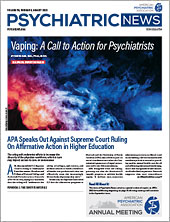Patients who are diagnosed with depression or anxiety within a year of experiencing cardiac arrest may have a higher risk of dying sooner than their peers who are not diagnosed with these mental illnesses, according to a study in JAMA Network Open.
“These findings suggest that psychological and neurologic interventions for survivors of [cardiac arrest] may be needed to improve long-term survival,” study researcher Jaehoon Oh, M.D., Ph.D., told Psychiatric News. Oh is the director of the Regional Emergency Medical Center at Hanyang University Hospital and a professor in the Department of Emergency Medicine at Hanyang University College of Medicine in Seoul, South Korea.
Oh and colleagues examined data from the claims records of 2,373 adults who were hospitalized after cardiac arrest between January 1, 2005, and December 31, 2015, and who survived for at least one year. The patients had a median age of 53 years, and 78% of them were male. None of the patients had been diagnosed with depression or anxiety within three years before their cardiac arrest. The researchers compared long-term survival rates of up to 14 years among those diagnosed with depression or anxiety, diagnosed with only depression, diagnosed with only anxiety, and those without depression or anxiety.
Overall, 16.7% of the patients were diagnosed with depression or anxiety in the year after their cardiac arrest; 10.6% were diagnosed with depression, and 9.6% were diagnosed with anxiety. Patients who were diagnosed with either disorder had a 41% greater risk of dying during the follow-up period compared with their peers without such a diagnosis. Specifically, those who were diagnosed with depression had a 44% greater risk of death.
Oh said that the physiological and environmental changes resulting from cardiac arrest can directly or indirectly contribute to the development of depression and anxiety.
“Direct factors include hypoxic brain injury, which can affect neurotransmitters such as norepinephrine, serotonin, and GABA … resulting in the onset of depression or anxiety disorders,” Oh explained. He added that indirect factors include the following:
•
Physical impairments or other aftereffects resulting from hypoxic brain injury.
•
The development of chronic complications in multiple organs following cardiac arrest, such as heart failure and renal failure, which render patients unable to resume their normal daily activities.
•
Secondary depression caused by restricted physical activity and multiple physical impairments, which may lead to social and economic isolation.
•
Side effects of medications used to control the cause or aftereffects of cardiac arrest, such as beta blockers, digoxin, ACE inhibitors, benzodiazepines, and antiepileptic drugs.
Oh said that it is beneficial for psychiatrists to connect with patients as soon as they stabilize after the acute phase of treatment for cardiac arrest.
“The psychiatrist should evaluate the patient’s mental health, establish a comprehensive plan that includes medication [if needed], and ensure the implementation of regular and long-term follow-up observation plans after discharge,” Oh said. “To ensure that cardiac arrest survivors receive ongoing mental health care even after discharge, it is important to establish regular and long-term plans and explain them to both the patient and their relatives [or caregivers].”
Oh said that because the recovery process after cardiac arrest may be prolonged, it is important to provide support for the patient’s physical, cognitive, and psychosocial needs alongside formal assessments.
“It would be particularly beneficial for health care professionals to have a good understanding of the local context, especially regarding the socioeconomic challenges faced by economically vulnerable individuals, to ensure effective coordination with social services when necessary,” Oh said.
This study was supported by the National Research Foundation of Korea. ■

